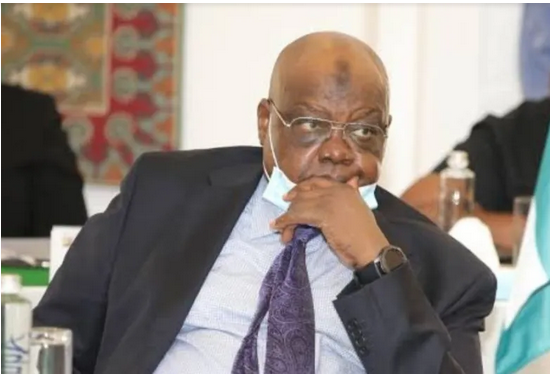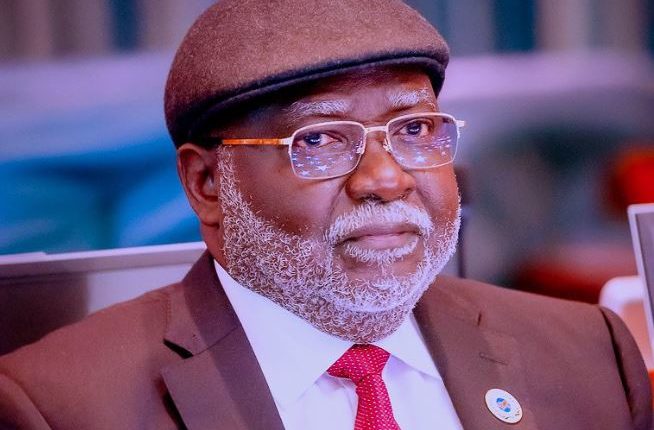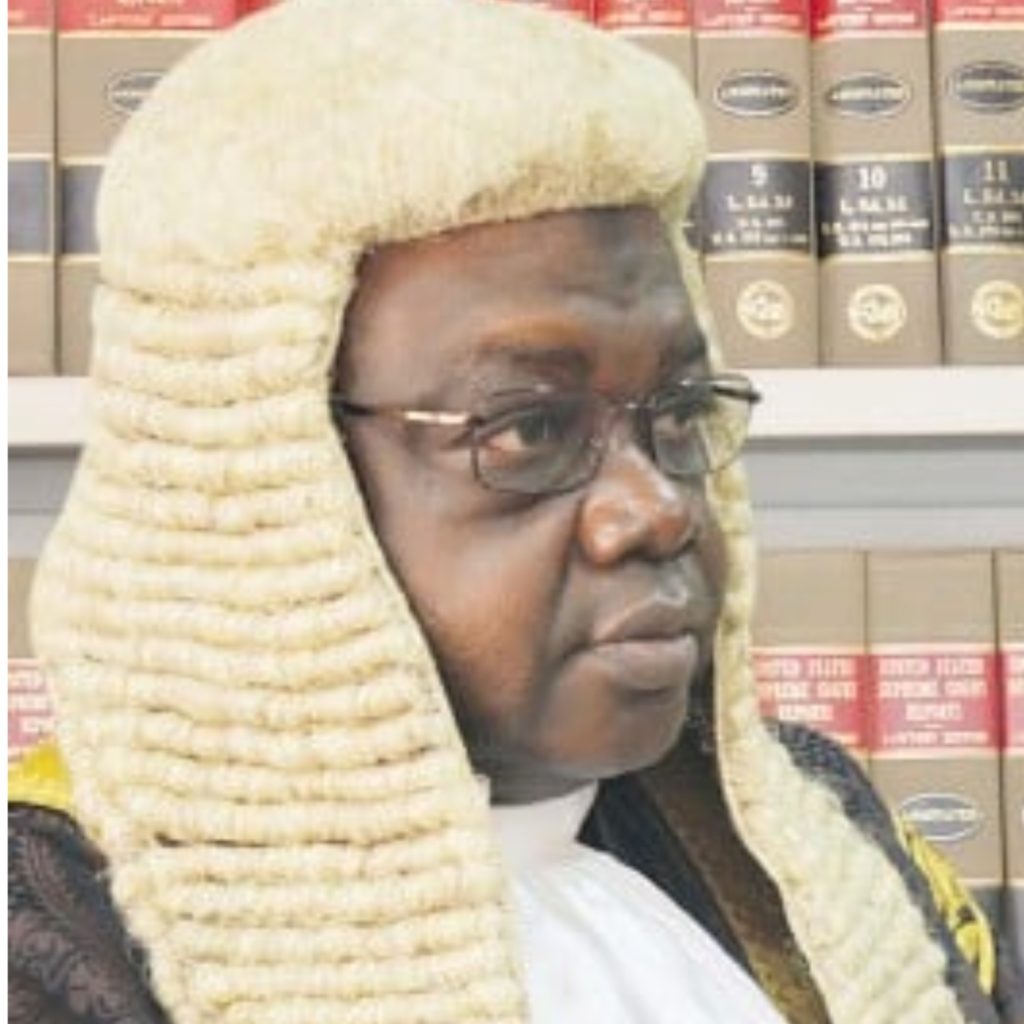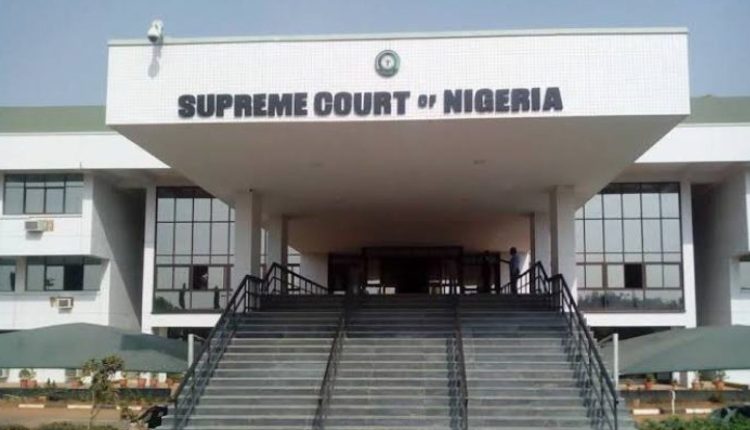‘Nigeria’s judiciary has become something else,’ laments retiring Justice Dattijo

![]()
Now retired Justice of the Supreme Court, Musa Dattijo Muhammad has lamented that the country’s apex court ‘has become something else’ owing to what he listed as absolute and abuse of powers by the incumbent Chief Justice of Nigeria (CJN), Olukayode Ariwoola.

Justice Musa Dattijo Muhammad
The retiring Justice also expressed worry over the ‘deliberate’ failure of the Judiciary to fill vacant slots of the South East and North Central at the apex court.
Speaking at a Special Valedictory court session to mark his retirement from the Supreme Court Bench, Friday, Justice Musa Dattijo Muhammad, further lamented that the incumbent Chief Justice of Nigeria (CJN), Olukayode Ariwoola has been saddled with too much powers based on the present structure of the judiciary, as he warned that ‘absolute powers corrupt absolutely.’
The justice concluded his speech by describing the country’s judicial institution as having become ‘something else,’ and not what it used to be.
Muhammad who also decried the poor welfare of justices noted that officers’ welfare and the quality of service the judiciary render have continued to decline since 2015.
“As presently structured, the CJN is Chairman of the NJC, which oversees both the appointment and discipline of judges, he is equally Chair of the Federal Judicial Service Commission (FJSC), the National Judicial Institute (NJI), the Legal Practitioners Privileges Committee (LPPC) that appoints Senior Advocate of Nigeria.
“In my considered opinion, the oversight functions of these bodies should not rest on an individual alone. A person with absolute powers, it is said, corrupts easily and absolutely,” Justice Muhammad said.
According to Muhammad, the situation is also responsible for the continued vacancy in the slots allocated to the South east and North Central geo-political zones, where he added that while only four regions are represented at the Supreme Court bench, the South West and North West alone have four representatives each, while the rest zones have only one justice in the bench of the apex court.
“My lord Hon. Justice Ejembi Eko JSC, who also represented the zone, retired on 23rd of May, 2022. It has been a year and five months now. There has not been any replacement.
“With the passing of my lord, Hon. Justice Chima Centus Nweze, JSC on 29th July 2023, the South East no longer has any presence at the Supreme Court. My lord, Hon. Justice Sylvester Nwali Ngwuta JSV died on 7th March 2021. There has not been any appointment in his stead for the South East.
“As it stands, only four geo-political regions- the South-West, South-South, North-West and North-East are represented in the Supreme Court.
“While the South-South and North-East have two serving justices, the North-West and South-West are fully represented with three each.
“Appropriate steps could have been taken since to fill outstanding vacancies in the apex court. Why have these steps not been timeously taken?
“It is evident that the decision not to fill the vacancies in the court is deliberate. It is all about the absolute powers vested in the office of the CJN and the responsible exercise of same,” the justice continued.

Speaking on the poor welfare of justices, Muhammad said the situation has continued to decline over time, as he lamented the poor funding of the judiciary via budgetary allocation despite its increase from N70 billion in 2015 to N165 billion presently.
“Justices and officers welfare and the quality of service the judiciary render have continued to decline.”
According to Muhammad, it was owing to allegations of corruption and perversion of justice that informed then President Muhammadu Buhari’s decision to order the invasion of homes and arrest of some judges in 2016.
“Not done, in 2019 the government accosted, arrested and arraigned the incumbent Chief Justice before the Code of Conduct Tribunal for alleged underhand conduct.
“With his retirement apparently negotiated, he was eventually left off the hook.
“In 2022, a letter signed by all other justices of the Supreme Court, including the current Chief Justice, the aggrieved protested against the shabby treatment meted to them by the head of court and the Chief Registrar.
“In the event, his lordship Ibrahim Tanko Muhammad disengaged ostensibly on grounds of ill-health.
“My lords, distinguished invitees, ladies and gentlemen, it is obvious that the judiciary I am exiting from is far from the one I voluntarily joined and desired to serve and be identified with. The institution has become something else.”
Meanwhile, following Justice Musa Dattijo Muhammad’s retirement, Friday, the number of Justices on the bench of the Supreme Court has now been reduced to 10.
This follows the earlier retirement of Justice Amina Augie on September 22, 2023, and the death of Justice Chima Nweze on July 31, 2023.
With this development, the apex court is short of justices out of the 21 stipulated by Section 230(2) of the 1999 Constitution.
Announcing Dattijo’s retirement last Sunday in a statement, the Court Spokesperson, Festus Akande disclosed that a valedictory court session would be held in his honour on Friday.
“The valedictory court session to mark the retirement of Justice Musa Dattijo Muhammad from the Supreme Court Bench comes up on Friday, 27th October, 2023 at the Main Courtroom of the Supreme Court of Nigeria.
The Special Court Session is to be presided over by the Chief Justice of Nigeria, Olukayode Ariwoola, who will customarily, pay tribute to Justice Musa Dattijo alongside other major stakeholders in the nation’s justice sector.
“Justice Musa Dattijo who hails from Chanchaga Local Government Area of Niger State, was born on Tuesday, October 27, 1953, in Minna.
“He took the oath of office as Justice of the Supreme Court on Tuesday, 10th July 2012. His ascension to the Court of Appeal was more of a reward for hard work, inherent passion for his chosen profession, dedication to duty, and above all, a resolute application of the law in its true letters and words to all cases that came to him.
“He earned a well-deserved elevation to the Court of Appeal on 21st November 1998 from the Niger State Judiciary, and served meritoriously at different Divisions,” Akande said in a statement.
Jusice Muhammad’s submission on the state of the country’s judicial system comes on the heels of the Supreme Court’s reaffirmation of the election of President Bola Tinubu in the February 25, 2023 election, after the Presidential Election Petitions Tribunal (PEPT) had earlier affirmed the decision of the Independent National Electoral Commission (INEC) to declare him winner.
Justice Muhammad who was originally listed in the bench of the Supreme Court seven-man panel to rule on the appeals filed by the presidential candidate of the Peoples Democratic Party (PDP) Atiku Abubakar and his Labour Party (LP) counterpart Peter Obi challenging President Tinubu’s election, withdrew himself citing retirement concerns.
The Supreme Court in its ruling, in Abuja, Thursday, dismissed the appeals by Atiku and Obi as lacking merit in their claims of fraud, electoral law violations, and Tinubu’s ineligibility to run for president.
The apex court dismissed all the grounds of appeal of Atiku and PDP on qualification, non-compliance with the Electoral Act, the 25 per cent votes in Federal Capital Territory (FCT), and electoral malpractices.
“On the whole, having resolved all the issues against the appellant, it is my view that there is no merit in the appeal and it is hereby dismissed
“The judgment of the court below delivered on September 6th, 2023 affirming the election of the second respondent as the duly elected President of the Federal Republic of Nigeria is hereby affirmed.
“As for issue Number 4 which has to do with double nomination which was not in Atiku’s appeal, it is the view of this court that this issue having been dealt with by this court, this court cannot allow the matter to be re-litigated in this very court. There must be an end to litigation.
“For us to sit down now and talk about when this man resigned or did not resign when they did fresh primaries to replace him which we have done before, we are not going to do this again.
“This matter ought not to have come in. When this matter was pending at the trial court, this court delivered that judgment. If you read the judgment of the lower court, they mentioned that the Supreme Court has settled this matter and that should have been the end.
“You now bring this issue of double nomination for us to sit on it and write another judgment, this is not how it should be. This appeal lacks merit and is hereby dismissed,” Justice Inyang Okoro ruled.
The apex court also affirmed that other panel members agreed with the lead judgment delivered by John Okoro, in dismissing Atiku’s appeal and challenging the judgment of the presidential petition tribunal.
Peter Obi had last month filed 51 grounds of appeal before the Supreme Court to invalidate the affirmation delivered by the Presidential Election Petitions Tribunal (PEPT) in September on President Bola Tinubu’s victory as declared by the Independent National Electoral Commission (INEC) on March 1, 2023 in the February 25 presidential poll.
Obi argued in his appeal that the PEPT erred in law and hence reached an erroneous decision when it denied his petition to contest the outcome of the February 25 presidential election.
Among other things, he claimed that the five-member panel of the Court of Appeal led by Justice Haruna Tsammani committed a grievous miscarriage of justice against him by ruling that he did not specify voting units where anomalies occurred during the election.
He informed the Supreme Court that the panel had wrongfully disregarded his claim that the Independent National Electoral Commission (INEC) had posted 18, 088 obscured results to its IReV platform.

Justice Musa Dattijo rtd
Furthermore, he claimed that the tribunal ignored his claim that certified true copies of documents issued by INEC to his legal team consisted of 8,123 blurred results containing blank A4 papers, pictures, and images of unknown persons, purporting to be the CTC of polling unit results of the presidential election.
Similarly, the PDP candidate, Atiku filed a notice of appeal predicated on 35 grounds, as he insisted that the tribunal committed a grave error and miscarriage of justice in its findings and conclusion in its petition challenging the Independent National Electoral Commission (INEC)’s declaration of Tinubu as President.
However, reacting to the Supreme Court judgement, Thursday afternoon, Tinubu in a statement, welcomed the verdict of the Justice John I. Okoro-led Panel of the Supreme Court on the Presidential Election petitions filed by the candidates of the Peoples Democratic Party and the Labour Party, challenging the ruling of the Presidential Election Petition Tribunal.
According to Tinubu, ‘The court has done justice to all issues put up for consideration in the petitions on the merits of the law, without fear or favour.’
“There is no doubt, with the profound judgment of today, that our electoral jurisprudence and constitutional democracy are further consolidated and embedded more indelibly in our national identity because of the diligence and undaunted professionalism of the Honourable Justices who presided over the matter,” Tinubu said.

Also, staff of the President congratulated him in his office, with his Special Adviser on Media and Publicity, Ajuri Ngelale, telling Tinubu ‘Your job is secured.’
Meanwhile, reacting to the ruling, Nigerians have questioned the judgement of the apex court in disregarding other points of appeal by the opposition at the court, including the highly-publicised forfeiture by President Tinubu to the United States court.
According to a Twitter (now X) user positing under the handle of @UkomahM, the Supreme Court ruling made no mention of the narcotics charge.
“Justice Okoro gave a public judgment that was televised with his 6 brothers… And there was no public mention on the case of forfeiting and payment of fine of $460,000 which are proceeds of narcotics trafficking.
“In minutes, they avoided mentioning all the germane issues under Section 137(1)(d). That’s the Justice that they serve,” the user wrote.
Also reacting, former Minister of Education, Mrs Oby Ezekwesili described the Supreme Court as a ‘Criminal Enterprise Gang.’
Commenting via her Twitter (formerly X) handle (@obyezeks), Thursday, the activist wrote:
“Now we all know the true definition of a Criminal Enterprise Gang.
“Some would ask, “Where’s now the hope?” because, what else can Citizens who seek a Good Society now do in the light of judicial enthronement of Criminality as an official Norm?
“Well, take heart in this fact. History shows that every Criminal Enterprise carries the seed of its eventual deconstruction.
“All. The. Time.
“So, do not be deceived.
“Nature abhors dishonest gain and knows how to deal with it from the inside.”



